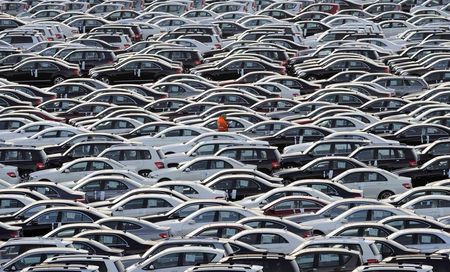By Alexandra Hudson
BERLIN (Reuters) - German exports plunged in August by their largest amount since the height of the financial crisis and leading institutes slashed their forecasts for growth, fuelling a debate on whether Berlin is doing enough to prop up Europe's economy and its own.
Exports slumped by 5.8 percent, the biggest drop since January 2009, in the latest sign that Europe's largest economy is faltering amid broader euro zone weakness and crises abroad that have battered confidence and led German firms to postpone investment plans.
"The economy seems to need a small miracle in September to avoid a recession in the third quarter," said Carsten Brzeski, an economist at ING.
The Federal Statistics Office said late-falling summer vacations in some German states had contributed to a fall in both exports and imports, but the figures still painted a gloomy picture for an economy that until recently was hailed in Berlin as Europe's "growth locomotive".
Earlier this week, industrial orders and output data sufferd their steepest drops in more than five years.
Hours after the trade data was released, a group of leading economic institutes joined the International Monetary Fund (IMF) in slashing forecasts for German growth. The institutes are now expecting growth of 1.3 percent this year and 1.2 percent next, down from 1.9 and 2.0 percent previously.
The institutes also urged the government to cut corporate taxes, spend more on infrastructure and education, and take steps to encourage private investment, stressing that there was sufficient "financial room for manoeuvre".
Chancellor Angela Merkel's government has faced pressure from within Germany as well as from ailing European states such as France and Italy to ratchet up public investment instead of prioritising deficit reduction.
So far, however, Berlin has made clear that its top priority is to deliver on its promise of a "schwarze Null" - a federal budget that is in the black, or fully balanced - in 2015.
"PRESTIGE PROJECT"
The institutes criticised this dogged focus, with Ferdinand Fichtner of Germany's DIW research institute deriding the balanced budget goal as a "prestige project" with "no immediate economic significance".
"There are surpluses in the public budget which could be used to increase investment," he told a news conference to present the institutes' report.
Merkel, speaking later at a news conference in Berlin with the visiting Polish prime minister, said the government was preparing for lower growth by "considering how to encourage extra investment, cut bureaucracy and invest in the future." She named energy and IT as two possible areas of focus.
The institutes further criticised Merkel's 10-month-old government for dampening growth by introducing a minimum wage and allowing some workers to retire early at 63 with full pension benefits. These remain unpopular with some in her party.
"It is plain that many of the government's policies have dampened instead of supported growth," Joachim Pfeiffer, a lawmaker in Merkel's Christian Democrats (CDU) told Reuters.
Germany had a strong start to the year but shrank by 0.2 percent in the second quarter. Evidence is mounting that it barely grew in the third quarter and some economists are forecasting another contraction in that period, which would amount to a technical recession.
The IMF, European Central Bank and Berlin's partners in Rome and Paris have all called on Merkel to spend more to avert a new European recession and Japanese-style deflationary spiral.
British finance minister George Osborne warned on Thursday that the euro zone risked "slipping back into crisis".
A growing number of economists argue that decades of weak investment in Germany have turned into the Achilles heel of the economy. The DIW institute estimates that the country is suffering from an annual investment gap of 80 billion euros.

At the start of the 1990s, public and private investment represented 23 percent of German gross domestic product (GDP). Now it is hovering around 17 percent - compared to an OECD average of 20 percent.
(Additional reporting by Stephen Brown, Andreas Rinke and Gernot Heller; Editing by Noah Barkin and Alison Williams)
